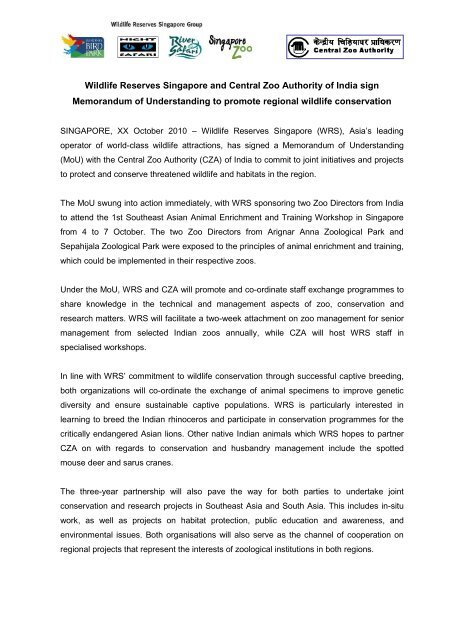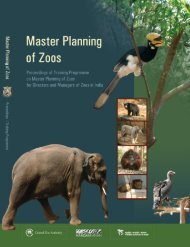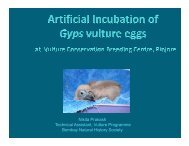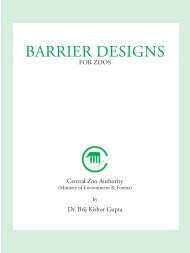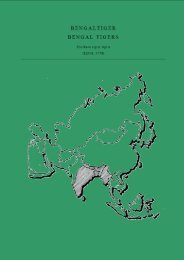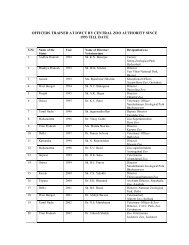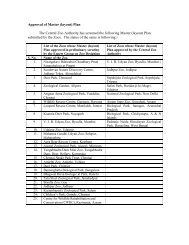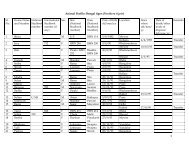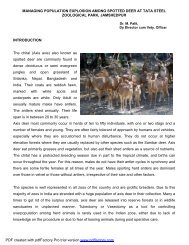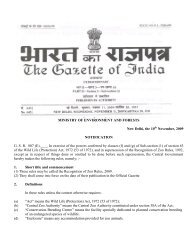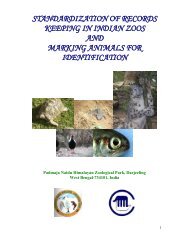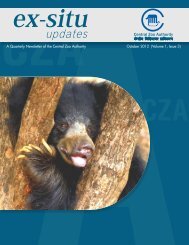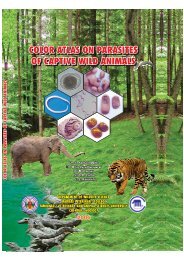Details - Central Zoo Authority
Details - Central Zoo Authority
Details - Central Zoo Authority
You also want an ePaper? Increase the reach of your titles
YUMPU automatically turns print PDFs into web optimized ePapers that Google loves.
Wildlife Reserves Singapore and <strong>Central</strong> <strong>Zoo</strong> <strong>Authority</strong> of India sign<br />
Memorandum of Understanding to promote regional wildlife conservation<br />
SINGAPORE, XX October 2010 – Wildlife Reserves Singapore (WRS), Asia’s leading<br />
operator of world-class wildlife attractions, has signed a Memorandum of Understanding<br />
(MoU) with the <strong>Central</strong> <strong>Zoo</strong> <strong>Authority</strong> (CZA) of India to commit to joint initiatives and projects<br />
to protect and conserve threatened wildlife and habitats in the region.<br />
The MoU swung into action immediately, with WRS sponsoring two <strong>Zoo</strong> Directors from India<br />
to attend the 1st Southeast Asian Animal Enrichment and Training Workshop in Singapore<br />
from 4 to 7 October. The two <strong>Zoo</strong> Directors from Arignar Anna <strong>Zoo</strong>logical Park and<br />
Sepahijala <strong>Zoo</strong>logical Park were exposed to the principles of animal enrichment and training,<br />
which could be implemented in their respective zoos.<br />
Under the MoU, WRS and CZA will promote and co-ordinate staff exchange programmes to<br />
share knowledge in the technical and management aspects of zoo, conservation and<br />
research matters. WRS will facilitate a two-week attachment on zoo management for senior<br />
management from selected Indian zoos annually, while CZA will host WRS staff in<br />
specialised workshops.<br />
In line with WRS’ commitment to wildlife conservation through successful captive breeding,<br />
both organizations will co-ordinate the exchange of animal specimens to improve genetic<br />
diversity and ensure sustainable captive populations. WRS is particularly interested in<br />
learning to breed the Indian rhinoceros and participate in conservation programmes for the<br />
critically endangered Asian lions. Other native Indian animals which WRS hopes to partner<br />
CZA on with regards to conservation and husbandry management include the spotted<br />
mouse deer and sarus cranes.<br />
The three-year partnership will also pave the way for both parties to undertake joint<br />
conservation and research projects in Southeast Asia and South Asia. This includes in-situ<br />
work, as well as projects on habitat protection, public education and awareness, and<br />
environmental issues. Both organisations will also serve as the channel of cooperation on<br />
regional projects that represent the interests of zoological institutions in both regions.
In addition, WRS and CZA will look into cultural exchanges such as performances,<br />
exhibitions, festivals, documentary and film screenings, as well as community activities,<br />
which will strengthen joint programmes.<br />
“This collaboration between WRS and CZA is part of our ongoing efforts to strengthen<br />
professional ties with top-class zoological institutions across the world to achieve the greater<br />
aim of protecting and conserving global biodiversity,” said Ms Fanny Lai, Group CEO,<br />
Wildlife Reserves Singapore. “Through this latest tie-up, we hope to share best practices<br />
and strengthen our research capabilities in improving the genetic diversity of zoo animals<br />
and those in the wild.”<br />
“This cooperation between WRS and CZA will have great significance particularly for the<br />
Indian zoos. Through this collaboration, we seek to improve the standards of the respective<br />
zoos and enhance the expertise of the Indian zoo personnel,” said Mr B.S Bonal, Member<br />
Secretary, <strong>Central</strong> <strong>Zoo</strong> <strong>Authority</strong>. “We also look forward to promoting and coordinating the<br />
exchange of animals with WRS to ensure sustainable captive breeding and enhance species<br />
existence in captivity for both organizations.”<br />
ABOUT WILDLIFE RESERVES SINGAPORE<br />
Wildlife Reserves Singapore (WRS) is the parent company of award-winning attractions<br />
Jurong Bird Park, Night Safari, Singapore <strong>Zoo</strong> and the upcoming River Safari. WRS parks<br />
strive to be world-class leisure attractions, providing excellent exhibits of animals presented<br />
in their natural environment for the purpose of conservation, education and recreation.<br />
In the areas of conservation and research, WRS parks have undertaken multiple projects<br />
through collaborations with various organizations and institutions on the oriental pied hornbill,<br />
pangolin and orang utan. Highly popular with tourists and locals, Jurong Bird Park welcomed<br />
900,000 visitors, the Night Safari, more than 1.1 million, and Singapore <strong>Zoo</strong> over 1.6 million<br />
visitors in 2009.<br />
More information can be found at www.wrs.com.sg
About <strong>Central</strong> <strong>Zoo</strong> <strong>Authority</strong> (CZA)<br />
In India, functioning of zoos is regulated by an autonomous statutory body called <strong>Central</strong><br />
<strong>Zoo</strong> <strong>Authority</strong> which has been constituted under the Wild Life (Protection) Act, 1972. The<br />
<strong>Authority</strong> consists of a Chairman, ten members and a Member Secretary. The main objective<br />
of the authority is to oversee the functioning of the zoos in the country and to provide them<br />
technical and other assistance for the improvement. Apart from the primary function of grant<br />
of recognition and release of financial assistance, the <strong>Central</strong> <strong>Zoo</strong> <strong>Authority</strong> also regulates<br />
the exchange of endangered animals listed under Schedule-I and II of the Wildlife Protection<br />
Act) amongst zoos. Standards and norms for housing, upkeep, health care and overall<br />
management of animals in zoos has been laid down under the Recognition of <strong>Zoo</strong> Rules,<br />
2009. The <strong>Authority</strong> also coordinates and implements programmes on capacity building of<br />
zoo personnel, planned breeding programmes and ex-situ research<br />
including biotechnological intervention for conservation of species for complementing in-situ<br />
conservation efforts in the country. Every zoo in the country is required to obtain recognition<br />
from the <strong>Authority</strong> for its operation. The <strong>Authority</strong> evaluates the zoos with reference to the<br />
parameters prescribed under the Recognition of <strong>Zoo</strong> Rules, 2009 and grants recognition<br />
accordingly. <strong>Zoo</strong>s which have no potential to come up to the prescribed standards and<br />
norms may be refused recognition and asked to close down. Since its inception in 1992, the<br />
<strong>Authority</strong> had received more than 510 applications for granting recognition as zoos. Based<br />
on the scrutiny of the documents and physical evaluations of the sites; the CZA has granted<br />
recognition to 199 facilities as zoos. Many of the others zoos either have been close down<br />
after rehabilitating the animals or asked to phase out their animals. The <strong>Authority</strong>’s role is<br />
more of a facilitator than a regulator. It, therefore, provides technical and financial assistance<br />
to such zoos which have the potential to attain the desired standard in animal<br />
management. Only such captive facilities which have neither the managerial skills nor the<br />
requisite resources are asked to close down. Some of the major initiatives undertaken by the<br />
<strong>Authority</strong> since its inception include the Establishment of Laboratory for Conservation of<br />
Endangered Species at Hyderabad for carrying out research in biotechnology, planned<br />
breeding of Red Panda and its restocking into the wild, upgrading of diagnostic facilities for<br />
disease diagnosis at selected veterinary institutions and their networking with zoos on<br />
regional basis for better health care of animals.<br />
More information can be found at www.cza.nic.in


